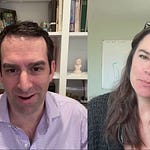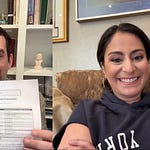Here’s today’s conversation from The Doctor’s Lounge with guest Dr. Craig Spencer. It was an inspiring 45 minutes that began with Craig doing us all the kind service of reading his powerful New York Times essay aloud from yesterday, entitled “You Don’t Have to Be a Doctor to Understand This.” Hearing Craig read his words was genuinely moving. (Yes, that was me getting a little verklempt at times.) Please take a listen. Below is a ChatGPT-generated summary of our conversation with timecodes so that you can watch or listen to particular parts that may grab your interest.
Thanks!
-Jeremy
(Note: I’ve been able to keep sessions like this free for everyone, thanks to recent upgrades that sustain this work. If you’d like to support work like this, please click here. Closed captions (㏄) and a transcript option (📄) can be found beneath the video playback control bar above.)
A summary of key points and highlights from The Doctor’s Lounge.
(Aided by ChatGPT.)
Craig reads his New York Times essay aloud.
2:20 — We opened with Craig reading his entire essay, and hearing it in his own voice added layers of meaning. The tension, the compassion, the risk — all of it hit differently aloud, especially the final scene when his own sheets are changed with the same dignity he once gave others.
Empathy isn’t a weakness — it’s who we are.
6:03 — We heard the core argument: that empathy isn't just idealism — it's the foundation of moral life. The backlash against it, from political elites to tech billionaires, isn’t just wrongheaded. It’s dangerous.
A flood of gratitude, across the spectrum.
10:29 — Craig told us he was inundated with messages: from global health leaders, rural pastors, even a Buddhist monk. The response spanned politics and geography — a reminder that moral clarity still resonates.
We’re not heroes — we’re human.
14:52 — One of the essay’s most powerful lines was cut in editing: “We didn’t do this because we’re heroes. We did it because we’re human.” That line still anchored our conversation. We agreed: dignity in dying is not an act of valor — it’s an act of humanity.
Global health grew out of empire — but it evolved.
17:40 — We traced global health’s origins through colonial medicine and missionary work. Craig emphasized how programs like PEPFAR and USAID emerged from that legacy — and became something much better: moral infrastructure, not imperial.
Empathy is under philosophical attack.
25:02 — We took on the “dark enlightenment” crowd. Musk, Vance, and others aren’t just being cold — they’re arguing that caring for others hurts the future. We rejected that fiction outright.
Decolonization means giving power back.
23:01 — We talked about localization. Craig described how USAID was doing the hard work of transferring control to local partners — and how abruptly that progress has been unraveled.
We can't fill the crater — but we have to try.
38:18 — Craig compared the cuts to carving out a crater. Philanthropy and NGOs are trying to shovel it back in — but we all know they can’t. Still, every shovel matters. Lives are at stake.
Most Americans still believe in moral leadership.
32:17 — A Pew survey shows 8 in 10 Americans support sending food and medicine abroad. We’re still the country that believes “America is great because America is good.” Someone should run on that.
Government must lead — but NGOs help patch holes
36:00 — We asked who should do this work. Craig’s answer: all of us. But governments have reach and permanence. NGOs can’t replace USAID — but they’re buying us time.














Share this post